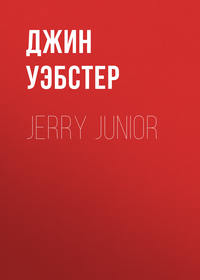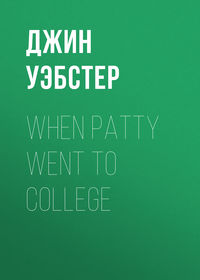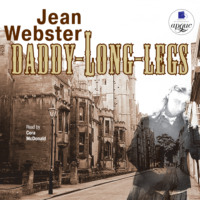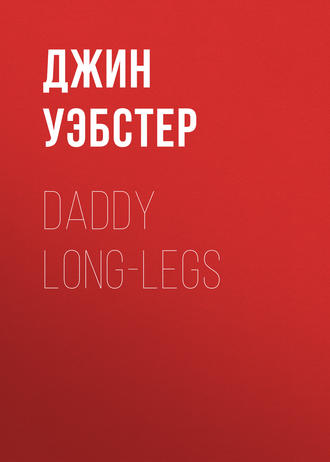 полная версия
полная версияDaddy Long-Legs
December 14th.
Dear Daddy-Long-Legs,
I dreamed the funniest dream last night. I thought I went into a book store and the clerk brought me a new book named “The Life and Letters of Judy Abbott.” I could see it perfectly plainly—red cloth binding with a picture of the John Grier Home on the cover, and my portrait for a frontispiece with, “Very truly yours, Judy Abbott,” written below. But just as I was turning to the end to read the inscription on my tombstone, I woke up. It was very annoying! I almost found out who I ’m going to marry and when I ’m going to die.
Don’t you think it would be interesting if you really could read the story of your life—written perfectly truthfully by an omniscient author? And suppose you could only read it on this condition: that you would never forget it, but would have to go through life knowing ahead of time exactly how everything you did would turn out, and foreseeing to the exact hour the time when you would die. How many people do you suppose would have the courage to read it then? Or how many could suppress their curiosity sufficiently to escape from reading it, even at the price of having to live without hope and without surprises?
Life is monotonous enough at best; you have to eat and sleep about so often. But imagine how deadly monotonous it would be if nothing unexpected could happen between meals. Mercy! Daddy, there ’s a blot, but I ’m on the third page and I can’t begin a new sheet.
I ’m going on with biology again this year—very interesting subject; we ’re studying the alimentary system at present. You should see how sweet a cross-section of the duodenum of a cat is under the microscope.
Also we ’ve arrived at philosophy—interesting but evanescent. I prefer biology where you can pin the subject under discussion to a board. There ’s another! And another! This pen is weeping copiously. Please excuse its tears.
Do you believe in free will? I do—unreservedly. I don’t agree at all with the philosophers who think that every action is the absolutely inevitable and automatic resultant of an aggregation of remote causes. That ’s the most immoral doctrine I ever heard—nobody would be to blame for anything. If a man believed in fatalism, he would naturally just sit down and say, “The Lord’s will be done,” and continue to sit until he fell over dead.
I believe absolutely in my own free will and my own power to accomplish—and that is the belief that moves mountains. You watch me become a great author! I have four chapters of my new book finished and five more drafted.
This is a very abstruse letter—does your head ache, Daddy? I think we ’ll stop now and make some fudge. I ’m sorry I can’t send you a piece; it will be unusually good, for we ’re going to make it with real cream and three butter balls.
Yours affectionately,Judy.P. S. We ’re having fancy dancing in gymnasium class. You can see by the accompanying picture how much we look like a real ballet. The one on the end accomplishing a graceful pirouette is me—I mean I.
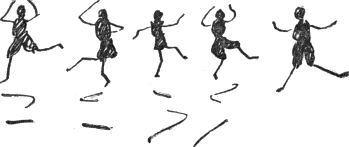
My dear, dear Daddy,
Have n’t you any sense? Don’t you know that you must n’t give one girl seventeen Christmas presents? I ’m a Socialist, please remember; do you wish to turn me into a Plutocrat?
Think how embarrassing it would be if we should ever quarrel! I should have to engage a moving van to return your gifts.
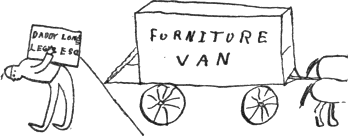
I am sorry that the necktie I sent was so wobbly; I knit it with my own hands (as you doubtless discovered from internal evidence). You will have to wear it on cold days and keep your coat buttoned up tight.
Thank you, Daddy, a thousand times. I think you ’re the sweetest man that ever lived—and the foolishest!
Judy.Here ’s a four-leaf clover from Camp McBride to bring you good luck for the New Year.
January 9th.
Do you wish to do something, Daddy, that will insure your eternal salvation? There is a family here who are in awfully desperate straits. A mother and father and four visible children—the two older boys have disappeared into the world to make their fortune and have not sent any of it back. The father worked in a glass factory and got consumption—it ’s awfully unhealthy work—and now has been sent away to a hospital. That took all of their savings, and the support of the family falls upon the oldest daughter who is twenty-four. She dressmakes for $1.50 a day (when she can get it) and embroiders centerpieces in the evening. The mother is n’t very strong and is extremely ineffectual and pious. She sits with her hands folded, a picture of patient resignation, while the daughter kills herself with overwork and responsibility and worry; she does n’t see how they are going to get through the rest of the winter—and I don’t either. One hundred dollars would buy some coal and some shoes for the three children so that they could go to school, and give a little margin so that she need n’t worry herself to death when a few days pass and she does n’t get work.
You are the richest man I know. Don’t you suppose you could spare one hundred dollars? That girl deserves help a lot more than I ever did. I would n’t ask it except for the girl; I don’t care much what happens to the mother—she is such a jelly-fish.
The way people are forever rolling their eyes to heaven and saying, “Perhaps it ’s all for the best,” when they are perfectly dead sure it ’s not, makes me enraged. Humility or resignation or whatever you choose to call it, is simply impotent inertia. I ’m for a more militant religion!
We are getting the most dreadful lessons in philosophy—all of Schopenhauer for to-morrow. The professor does n’t seem to realize that we are taking any other subject. He ’s a queer old duck; he goes about with his head in the clouds and blinks dazedly when occasionally he strikes solid earth. He tries to lighten his lectures with an occasional witticism—and we do our best to smile, but I assure you his jokes are no laughing matter. He spends his entire time between classes in trying to figure out whether matter really exists or whether he only thinks it exists.
I ’m sure my sewing girl has n’t any doubt but that it exists!
Where do you think my new novel is? In the waste basket. I can see myself that it ’s no good on earth, and when a loving author realizes that, what would be the judgment of a critical public?
Later.
I address you, Daddy, from a bed of pain. For two days I ’ve been laid up with swollen tonsils; I can just swallow hot milk, and that is all. “What were your parents thinking of not to have those tonsils out when you were a baby?” the doctor wished to know. I ’m sure I have n’t an idea, but I doubt if they were thinking much about me.
Yours,J. A.Next morning.
I just read this over before sealing it. I don’t know why I cast such a misty atmosphere over life. I hasten to assure you that I am young and happy and exuberant; and I trust you are the same. Youth has nothing to do with birthdays, only with alivedness of spirit, so even if your hair is gray, Daddy, you can still be a boy.
Affectionately,Judy.Jan. 12th.
Dear Mr. Philanthropist,
Your check for my family came yesterday. Thank you so much! I cut gymnasium and took it down to them right after luncheon, and you should have seen the girl’s face! She was so surprised and happy and relieved that she looked almost young; and she ’s only twenty-four. Is n’t it pitiful?
Anyway, she feels now as though all the good things were coming together. She has steady work ahead for two months—some one ’s getting married, and there ’s a trousseau to make.
“Thank the good Lord!” cried the mother, when she grasped the fact that that small piece of paper was one hundred dollars.
“It was n’t the good Lord at all,” said I, “it was Daddy-Long-Legs.” (Mr. Smith, I called you.)
“But it was the good Lord who put it in his mind,” said she.
“Not at all! I put it in his mind myself,” said I.
But anyway, Daddy, I trust the good Lord will reward you suitably. You deserve ten thousand years out of purgatory.
Yours most gratefully,Judy Abbott.Feb. 15th.
May it please Your Most Excellent Majesty:
This morning I did eat my breakfast upon a cold turkey pie and a goose, and I did send for a cup of tee (a china drink) of which I had never drank before.
Don’t be nervous, Daddy—I have n’t lost my mind; I ’m merely quoting Sam’l Pepys. We ’re reading him in connection with English History, original sources. Sallie and Julia and I converse now in the language of 1660. Listen to this:
“I went to Charing Cross to see Major Harrison hanged, drawn and quartered: he looking as cheerful as any man could do in that condition.” And this: “Dined with my lady who is in handsome mourning for her brother who died yesterday of spotted fever.”
Seems a little early to commence entertaining, does n’t it? A friend of Pepys devised a very cunning manner whereby the king might pay his debts out of the sale to poor people of old decayed provisions. What do you, a reformer, think of that? I don’t believe we ’re so bad to-day as the newspapers make out.
Samuel was as excited about his clothes as any girl; he spent five times as much on dress as his wife—that appears to have been the Golden Age of husbands. Is n’t this a touching entry? You see he really was honest. “To-day came home my fine Camlett cloak with gold buttons, which cost me much money, and I pray God to make me able to pay for it.”
Excuse me for being so full of Pepys; I ’m writing a special topic on him.
What do you think, Daddy? The Self-Government Association has abolished the ten-o’clock rule. We can keep our lights all night if we choose, the only requirement being that we do not disturb others—we are not supposed to entertain on a large scale. The result is a beautiful commentary on human nature. Now that we may stay up as long as we choose, we no longer choose. Our heads begin to nod at nine o’clock, and by nine-thirty the pen drops from our nerveless grasp. It ’s nine-thirty now. Good night.
Sunday.
Just back from church—preacher from Georgia. We must take care, he says, not to develop our intellects at the expense of our emotional natures—but methought it was a poor, dry sermon (Pepys again). It does n’t matter what part of the United States or Canada they come from, or what denomination they are, we always get the same sermon. Why on earth don’t they go to men’s colleges and urge the students not to allow their manly natures to be crushed out by too much mental application?
It ’s a beautiful day—frozen and icy and clear. As soon as dinner is over, Sallie and Julia and Marty Keene and Eleanor Pratt (friends of mine, but you don’t know them) and I are going to put on short skirts and walk ’cross country to Crystal Spring Farm and have a fried chicken and waffle supper, and then have Mr. Crystal Spring drive us home in his buckboard. We are supposed to be inside the campus at seven, but we are going to stretch a point to-night and make it eight.
Farewell, kind Sir.
I have the honour of subscribing myself,
Your most loyall, dutifull, faithfull and obedient servant,J. Abbott.March Fifth.
Dear Mr. Trustee,
To-morrow is the first Wednesday in the month—a weary day for the John Grier Home. How relieved they ’ll be when five o’clock comes and you pat them on the head and take yourselves off! Did you (individually) ever pat me on the head, Daddy? I don’t believe so—my memory seems to be concerned only with fat Trustees.
Give the Home my love, please—my truly love. I have quite a feeling of tenderness for it as I look back through a haze of four years. When I first came to college I felt quite resentful because I ’d been robbed of the normal kind of childhood that the other girls had had; but now, I don’t feel that way in the least. I regard it as a very unusual adventure. It gives me a sort of vantage point from which to stand aside and look at life. Emerging full grown, I get a perspective on the world, that other people who have been brought up in the thick of things, entirely lack.
I know lots of girls (Julia, for instance) who never know that they are happy. They are so accustomed to the feeling that their senses are deadened to it, but as for me—I am perfectly sure every moment of my life that I am happy. And I ’m going to keep on being, no matter what unpleasant things turn up. I ’m going to regard them (even toothaches) as interesting experiences, and be glad to know what they feel like. “Whatever sky ’s above me, I ’ve a heart for any fate.”
However, Daddy, don’t take this new affection for the J. G. H. too literally. If I have five children, like Rousseau, I shan’t leave them on the steps of a foundling asylum in order to insure their being brought up simply.
Give my kindest regards to Mrs. Lippett (that, I think, is truthful; love would be a little strong) and don’t forget to tell her what a beautiful nature I ’ve developed.
Affectionately,Judy.Lock Willow,April 4th.Dear Daddy,
Do you observe the postmark? Sallie and I are embellishing Lock Willow with our presence during the Easter vacation. We decided that the best thing we could do with our ten days was to come where it is quiet. Our nerves had got to the point where they would n’t stand another meal in Fergussen. Dining in a room with four hundred girls is an ordeal when you are tired. There is so much noise that you can’t hear the girls across the table speak unless they make their hands into a megaphone and shout. That is the truth.
We are tramping over the hills and reading and writing, and having a nice, restful time. We climbed to the top of “Sky Hill” this morning where Master Jervie and I once cooked supper—it does n’t seem possible that it was nearly two years ago. I could still see the place where the smoke of our fire blackened the rock. It is funny how certain places get connected with certain people, and you never go back without thinking of them. I was quite lonely without him—for two minutes.
What do you think is my latest activity, Daddy? You will begin to believe that I am incorrigible—I am writing a book. I started it three weeks ago and am eating it up in chunks. I ’ve caught the secret. Master Jervie and that editor man were right; you are most convincing when you write about the things you know. And this time it is about something that I do know—exhaustively. Guess where it ’s laid? In the John Grier Home! And it ’s good, Daddy, I actually believe it is—just about the tiny little things that happened every day. I ’m a realist now. I ’ve abandoned romanticism; I shall go back to it later though, when my own adventurous future begins.
This new book is going to get itself finished—and published! You see if it does n’t. If you just want a thing hard enough and keep on trying, you do get it in the end. I ’ve been trying for four years to get a letter from you—and I have n’t given up hope yet.
Good-by, Daddy dear,
(I like to call you Daddy dear; it ’s so alliterative.)
Affectionately,Judy.P. S. I forgot to tell you the farm news, but it ’s very distressing. Skip this postscript if you don’t want your sensibilities all wrought up.
Poor old Grove is dead. He got so he could n’t chew and they had to shoot him.
Nine chickens were killed by a weasel or a skunk or a rat last week.
One of the cows is sick, and we had to have the veterinary surgeon out from Bonnyrigg Four Corners. Amasai stayed up all night to give her linseed oil and whisky. But we have an awful suspicion that the poor sick cow got nothing but linseed oil.
Sentimental Tommy (the tortoise-shell cat) has disappeared; we are afraid he has been caught in a trap.
There are lots of troubles in the world!
May 17th.Dear Daddy-Long-Legs,
This is going to be extremely short because my shoulder aches at the sight of a pen. Lecture notes all day, immortal novel all evening makes too much writing.
Commencement three weeks from next Wednesday. I think you might come and make my acquaintance—I shall hate you if you don’t! Julia ’s inviting Master Jervie, he being her family, and Sallie ’s inviting Jimmie McB., he being her family, but who is there for me to invite? Just you and Mrs. Lippett, and I don’t want her. Please come.
Yours, with love and writer’s cramp.Judy.Lock Willow.June 19th.
Dear Daddy-Long-Legs,
I ’m educated! My diploma is in the bottom bureau drawer with my two best dresses. Commencement was as usual, with a few showers at vital moments. Thank you for your rosebuds. They were lovely. Master Jervie and Master Jimmie both gave me roses, too, but I left theirs in the bath tub and carried yours in the class procession.
Here I am at Lock Willow for the summer—forever maybe. The board is cheap; the surroundings quiet and conducive to a literary life. What more does a struggling author wish? I am mad about my book. I think of it every waking moment, and dream of it at night. All I want is peace and quiet and lots of time to work (interspersed with nourishing meals).
Master Jervie is coming up for a week or so in August, and Jimmie McBride is going to drop in sometime through the summer. He ’s connected with a bond house now, and goes about the country selling bonds to banks. He ’s going to combine the “Farmers’ National” at the Corners and me on the same trip.
You see that Lock Willow is n’t entirely lacking in society. I ’d be expecting to have you come motoring through—only I know now that that is hopeless. When you would n’t come to my commencement, I tore you from my heart and buried you forever.
Judy Abbott, A.B.July 24th.
Dearest Daddy-Long-Legs,
Is n’t it fun to work—or don’t you ever do it? It ’s especially fun when your kind of work is the thing you ’d rather do more than anything else in the world. I ’ve been writing as fast as my pen would go every day this summer, and my only quarrel with life is that the days are n’t long enough to write all the beautiful and valuable and entertaining thoughts I ’m thinking.
I ’ve finished the second draft of my book and am going to begin the third to-morrow morning at half-past seven. It ’s the sweetest book you ever saw—it is, truly. I think of nothing else. I can barely wait in the morning to dress and eat before beginning; then I write and write and write till suddenly I ’m so tired that I ’m limp all over. Then I go out with Colin (the new sheep dog) and romp through the fields and get a fresh supply of ideas for the next day. It ’s the most beautiful book you ever saw—Oh, pardon—I said that before.
You don’t think me conceited, do you, Daddy dear?
I ’m not, really, only just now I ’m in the enthusiastic stage. Maybe later on I ’ll get cold and critical and sniffy. No, I ’m sure I won’t! This time I ’ve written a real book. Just wait till you see it.
I ’ll try for a minute to talk about something else. I never told you, did I, that Amasai and Carry got married last May? They are still working here, but so far as I can see it has spoiled them both. She used just to laugh when he tramped in mud or dropped ashes on the floor, but now—you should hear her scold! And she does n’t curl her hair any longer. Amasai, who used to be so obliging about beating rugs and carrying wood, grumbles if you suggest such a thing. Also his neckties are quite dingy—black and brown, where they used to be scarlet and purple. I ’ve determined never to marry. It ’s a deteriorating process, evidently.
There is n’t much of any farm news. The animals are all in the best of health. The pigs are unusually fat, the cows seem contented and the hens are laying well. Are you interested in poultry? If so, let me recommend that invaluable little work, “200 Eggs per Hen per Year.” I am thinking of starting an incubator next spring and raising broilers. You see I ’m settled at Lock Willow permanently. I have decided to stay until I ’ve written 114 novels like Anthony Trollope’s mother. Then I shall have completed my life work and can retire and travel.
Mr. James McBride spent last Sunday with us. Fried chicken and ice-cream for dinner, both of which he appeared to appreciate. I was awfully glad to see him; he brought a momentary reminder that the world at large exists. Poor Jimmie is having a hard time peddling his bonds. The Farmers’ National at the Corners would n’t have anything to do with them in spite of the fact that they pay six per cent. interest and sometimes seven. I think he ’ll end by going home to Worcester and taking a job in his father’s factory. He ’s too open and confiding and kind-hearted ever to make a successful financier. But to be the manager of a flourishing overall factory is a very desirable position, don’t you think? Just now he turns up his nose at overalls, but he ’ll come to them.
I hope you appreciate the fact that this is a long letter from a person with writer’s cramp. But I still love you, Daddy dear, and I ’m very happy. With beautiful scenery all about, and lots to eat and a comfortable four-post bed and a ream of blank paper and a pint of ink—what more does one want in the world?
Yours, as always,Judy.P. S. The postman arrives with some more news. We are to expect Master Jervie on Friday next to spend a week. That ’s a very pleasant prospect—only I am afraid my poor book will suffer. Master Jervie is very demanding.
August 27th.
Dear Daddy-Long-Legs,
Where are you, I wonder?
I never know what part of the world you are in, but I hope you ’re not in New York during this awful weather. I hope you ’re on a mountain peak (but not in Switzerland; somewhere nearer) looking at the snow and thinking about me. Please be thinking about me. I ’m quite lonely and I want to be thought about. Oh, Daddy, I wish I knew you! Then when we were unhappy we could cheer each other up.
I don’t think I can stand much more of Lock Willow. I ’m thinking of moving. Sallie is going to do settlement work in Boston next winter. Don’t you think it would be nice for me to go with her, then we could have a studio together? I could write while she settled and we could be together in the evenings. Evenings are very long when there ’s no one but the Semples and Carrie and Amasai to talk to. I know ahead of time that you won’t like my studio idea. I can read your secretary’s letter now:
“Miss Jerusha Abbott.
“Dear Madam,“Mr. Smith prefers that you remain at Lock Willow.
“Yours truly,“Elmer H. Griggs”.I hate your secretary. I am certain that a man named Elmer H. Griggs must be horrid. But truly, Daddy, I think I shall have to go to Boston. I can’t stay here. If something does n’t happen soon, I shall throw myself into the silo pit out of sheer desperation.
Mercy! but it ’s hot. All the grass is burnt up and the brooks are dry and the roads are dusty. It has n’t rained for weeks and weeks.
This letter sounds as though I had hydrophobia, but I have n’t. I just want some family.
Good-by, my dearest Daddy.
I wish I knew you.Judy.Lock Willow,September 19th.
Dear Daddy,
Something has happened and I need advice. I need it from you, and from nobody else in the world. Would n’t it be possible for me to see you? It ’s so much easier to talk than to write; and I ’m afraid your secretary might open the letter.
Judy.P. S. I ’m very unhappy.
Lock Willow,October 3d.
Dear Daddy-Long-Legs,
Your note written in your own hand—and a pretty wobbly hand!—came this morning. I am so sorry that you have been ill; I would n’t have bothered you with my affairs if I had known. Yes, I will tell you the trouble, but it ’s sort of complicated to write, and very private. Please don’t keep this letter, but burn it.
Before I begin—here ’s a check for one thousand dollars. It seems funny, does n’t it, for me to be sending a check to you? Where do you think I got it?
I ’ve sold my story, Daddy. It ’s going to be published serially in seven parts, and then in a book! You might think I ’d be wild with joy, but I ’m not. I ’m entirely apathetic. Of course I ’m glad to begin paying you—I owe you over two thousand more. It ’s coming in instalments. Now don’t be horrid, please, about taking it, because it makes me happy to return it. I owe you a great deal more than the mere money, and the rest I will continue to pay all my life in gratitude and affection.





